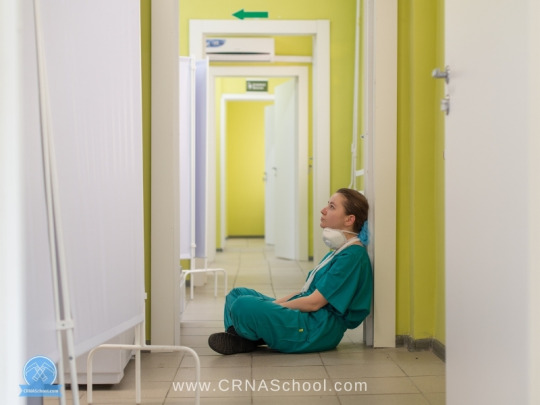#BecomeACRNA
Text
How Does A Registered Nurse Become A CRNA?

Licensed Nurses with a CRNA degree provide anesthesia in conjunction with physicians, dentists, podiatrists, physician anesthesiologists, and additional healthcare experts, according to the American Association of Nurse Anesthetists, and provide the bulk of anesthesia services in rural America.
A registered nurse must meet important criteria in order to become a CRNA, pursuing specializations, enrolling in an approved nurse anesthesia program, achieving qualifications, and obtaining licenses.
Consider becoming a Certified Registered Nurse Anesthetist (CRNA) if you are a registered nurse who is self-sufficient, devoted to delivering high-quality patient care, and active in progressing in your profession. You’ll also be making substantially more money. Plus, you’ll have plenty of job opportunities in a burgeoning profession. From 2018 to 2028, the Bureau of Labor Statistics expects a 17 percent rise in work openings and demand for CRNAs.
Below, we’ll look at the steps a registered nurse must take to become a CRNA.
Is a CRNA a nurse?
An advanced practicing registered nurse (APRN) who is licensed and qualified to provide anesthesia for surgery, labor, and childbirth, emergency treatment, or pain relief is classified as a nurse anesthetist.
The CRNA degree offers the expertise and training required to prescribe and prescribe anesthesia to patients, as well as observe and advise physicians of their patients' conditions when they are under anesthesia. Pre- and post-anesthesia treatment and reports are given by degrees.
Some people are surprised to hear that nurses and anesthesiologists deliver anesthesia care in the same way: they provide the same treatment with the same operations in the same styles of hospitals. The anesthesiologists work with the CRNAs to provide the best quality treatment for the patients.
According to the American Association of Nurse Anesthetists (AANA), nurse anesthetists have the bulk of hands-on anesthesia emergency treatment in the United States.
Certified Registered Nurse Anesthetists (CRNAs) originated during the Civil War, when nurses on the front lines began prescribing chloroform to injured soldiers. Today, CRNAS deliver anesthesia in almost all rural American hospitals, and are the exclusive anesthesia services for men and women working in the United States Armed Forces (USAF) .
You'll find a lively, in-demand job as a CRNA, but you'll require advanced preparation and outstanding education to smooth the path to the top of the nursing profession.

What Are the Requirements for a CRNA Degree?
Though each CRNA curriculum has its own set of standards, the chief requirements are usually the same for all schools.
A bachelor's or master's degree in nursing or a related field is needed.
A valid certificate as a Registered Nurse or Advanced Practice Nurse with no restrictions.
One year of full-time service as an RN in a critical care environment is expected.
A master's degree in nurse anesthesia from an approved program is needed.
Most CRNA programs last two to four years. The curriculum typically provides both theoretical classroom instruction and practical clinical hours, where students learn to anesthesia care to patients in a variety of settings.
How can I become a CRNA fast?
1. Look for specializations while working as an RN in a critical care environment
If an RN has the necessary number of clinical practice hours, they may obtain a critical-care registered nurse (CCRN) credential when employed as an RN. A CCRN is a specialist credential for nurses who give primary treatment to extremely sick adult patients in every environment.
One year of full-time experience, or its part-time equivalent, as a certified nurse in a critical care environment is expected, according to the American Association of Nurse Anesthetists.

2. Be accepted into an approved nurse anesthesia program
Applicants must be admitted into an approved graduate nurse anesthesia program before they can become a licensed CRNA. Students can select from 121 separate approved nurse anesthesia programs and almost 1,800 active clinical centers across the USA.
Course standards differ by college or institution, although most require a candidate to have a current RN license, a bachelor's degree in nursing, and a minimum GPA. A master's degree in nursing may be needed for certain programs.
RNs joining nurse anesthesia programs usually have, on average, a total of 2.9 years of training (AANA, 2019).
3. Get your degree of doctor of nursing practice in anesthesia(DNAP)
Some nurse anesthesia programs offer a master's degree that prepares graduates to sit for the CRNA qualification test. This is a crucial step, since by 2025, you'll need a doctorate in nurse anesthesia to work as a CRNA. Until 2022, a few programs will already deliver a master's degree that fits the qualification requirements.
Although CRNAs with a master's degree will be grandfathered in, many degree-seekers are already opting for doctoral programs, which will provide them with the most specialized skills and experience in the profession and enable them to explore further job choices with higher pay.
Anesthesia pharmacology, obstetric anesthesia, anesthesia pathophysiology, anesthesia pathology, and geriatric anesthesia are among the subjects discussed in greater detail in DNAP programs.

4. Acquire the Nurse Anesthetist Certification and Recertification from the national board of certification (NBCRNA)
After completing their degree from an approved program, professionals must complete the national qualification test and gain certification from the National Board of Certification and Recertification for Nurse Anesthetists. Professionals must pass the exam by answering between 100 and 170 questions on detailed topics.
5. Acquire nurse practitioner state licensing
Professionals who wish to work as nurse anesthetist in specialized practice nursing must obtain state-specific licensing. The licensing standards differ from state to state.
6. Look for employment
Verified nurse anesthetists usually find work as entry-level anesthetists after graduating from an approved program and passing the specialty qualification test. Professionals can apply for jobs in specific fields as they gain more career experience.
The Bottom Line
A licensed registered nurse anesthetist (CRNA) is responsible for efficiently prescribing anesthesia before emergency operations, then delivering vital treatment at some of the most crucial moments of their patients' lives.
Whatever stage of your undergraduate or professional life you are in, there is a clear direction to pursue that will lead to a fulfilling future as a nurse anesthetist. If you haven't already done so, get a CCNE-accredited bachelor's degree in nursing from a respectable nursing school.
If you're interested in studying more, make sure your next move is a smart investment in your nursing career.
References
Military Medicine, Volume 171, Issue 8, August 2006, Pages 762–769, Constance L. Jenkins, NC USA, Aaron R. Elliott, NC USA, Janet R. Harris, NC USA https://doi.org/10.7205/MILMED.171.8.762
AANA Journal. Aug2017, Vol. 85 Issue 4, p261-269. 9p. Boyd, Donald
The Certified Registered Nurse Anesthetist: Occupational Responsibilities, Perceived Stressors, Coping Strategies, and Work Relationships. Perry, Tristan Roberts http://hdl.handle.net/10919/29740
Nurse Anesthesia, A Past, Present, and Future Perspective. VOLUME 47, ISSUE 2, P215-223, JUNE 01, 2012, Wanda O. Wilson, CRNA, Ph.D., MSN
youtube
In case you cannot view this video here, please click the link below to view How Does a Registered Nurse Become a CRNA? on my YouTube channel: https://www.youtube.com/watch?v=-MFrgaTuz3Q
1 note
·
View note
Text
New Post has been published on New World Air
http://www.newworld-air.com/all-about-office-anesthesia/
All About Office Anesthesia
There has been an increase in office anesthesia for dental, podiatrist, surgical and non-surgical medical treatments, which provides a safe alternative to the traditional hospitals and large health care facilities. According to the Official Journal of the International Anesthesia Research Society from the year 1995 to 2005, the number of procedures had doubled to 10 million per year.
Various operations that were once performed in hospitals such as abdominoplasties and liposuctions, have now shifted to physician’s clinics and office settings. This transformation has shown to offer benefits to the health care providers as well as the patients.
Some of the advantages…
* Patients will feel comfortable receiving treatment in their doctor’s office, as there is less noise, intrusions and more privacy then in the context of a hospital.
* Greater personal care can be given to patients, since the health care worker will not have to hasten from room to room, attempting to check on numerous patients. It is also easier for the person who requires medical care to become familiar with the staff.
* Office-based care lowers the risk of individuals suffering due to nosocomial transmissions, which are infections that can develop in a hospital environment.
* Being able to lower billing and adding to the bottom line is a good reason for administering anesthetic in the office. Hospitals can charge fees for items including the drug agents, equipment use, surgical instruments, staffing the use of the operating room as well as for the clean up. Overall, having your own space to handle clients can save thousands of dollars long-term.
Collaborating with an anesthesia management service…
Becoming a partner with an anesthesia management program can take the burden off health care providers so they can concentrate on their patients. They might deliver services including support for the medical team in arranging for the surgical procedure, provide proficient sedation agents, supply a variety of medical equipment, handle all your patient billing and invoices as well as provide extra personnel if required.
Mentioning extra personnel, a professional management company will make sure the people who work with the physicians and staff members are thoroughly vetted. As specialist, they will have had experience with the different types of anesthetic such as general, local, regional and intravenous anesthetics. They are usually able to do their work without supervision.
Over a period of time, cooperating with a like-minded business contributes to more productivity and savings for the doctors and patients.
In the past, there were some concerns about employing anesthetics outside of conventional medical facilities. However, with the support of properly trained management, the Institute of Medicine stated this process is 50 times safer today then it was in the 1980s. It is predicted, as technology and education in medicine continues to improve, office anesthesia will continue to grow more popular as people opt for more individualized care.
Source
http://journals.lww.com/anesthesia-analgesia/Fulltext/2014/08000/Office_Based_Anesthesia___Safety_and_Outcomes.12.aspx#P17
http://www.aana.com/ceandeducation/becomeacrna/Pages/Nurse-Anesthetists-at-a-Glance.aspx
#AllAboutOfficeAnesthesia, #OfficeAnesthesia
0 notes
Text
Is Med School A Requirement To Become A CRNA?

If you’re reading this, you may be either a registered nurse or a student with the hopes of becoming a CRNA. If this is the case, you may have many questions about how to get there. For instance, do you need to go to medical school to become a nurse anesthetist?
The simple answer to this is no. A certified registered nurse anesthetist is a certification in nursing practice. This means that you need to be a nurse beforehand, not a doctor. However, there are quite a few steps before getting certified as a nurse anesthetist. Medical school is not one of them, though.
Depending on where you are at right now, the journey to CRNA may be a little long. But, if you know exactly what you need ahead of time, it will be as smooth as possible. Whether you are already a nurse or a student, this article is here to help you with that journey.
What Do You Need to Do to Become a CRNA?
You may already be a nurse who is looking for a direction to take your career or you may be a nursing student who has Nurse Anesthetist in their sights as a career option.
Either way, I’ll tell you about all the steps you need to take. I will be starting from the very beginning.
Before you can become a CRNA, you need to be a registered nurse. And to get there, you’ll need a Bachelor of Science in Nursing degree beforehand. This is a four-year degree.

1. Become a Registered Nurse. Once you have your BSN, you can take the next step to become an RN. You will have to write and pass the NCLEX-RN examination. This stands for the National Council Licensure Examination for Registered Nurses. Once you have passed this exam, you can apply for your RN license. This is done based on your state. Each state has its fees and requirements associated with it. Depending on the state, the amount of time it’ll take from applying to getting your license may vary.
There is something important to note. The two-year Associate Degree in Nursing can be used to become a registered nurse. But to become a CRNA, you need a BSN.
2. Gain valuable experience. Once you have become a registered nurse you will need to have at least 1 year of Critical Care experience. Some programs now may require you to have 2 years. This can be an intensive care unit or an emergency room, for instance. One year is the official requirement, but some schools may have higher criteria. Be sure to check the programs you want to apply for and their requirements. Make sure you choose an accredited program.
3. Get a Master’s Degree of Science in Nurse Anesthesia. Once you have your required experience, you can apply for a master’s degree in a nurse anesthesia program. This is roughly a two-year program in most cases. It is very important to note that the requirements to become a CRNA will change by 2025. An MSN will no longer be the minimum requirement. Instead, you will need to have a Doctor of Nursing Practice degree. This takes about a year longer than an MSN does to get.
4. Pass the National Certification Exam. To get the coveted CRNA credential, you will need to pass the NCE. The National Board of Certification & Recertification for Nurse Anesthetists organizes this. Once you conquer this, your state board receives the results. You need to follow a few more steps depending on your state. Once that’s done, you are a CRNA!

What Does a Nurse Anesthetist Do?
If you want to become a certified registered nurse anesthetist, it is important to know the job well. It is a long road to becoming a CRNA, after all. You should get to know the job description and their function.. This will help you know for sure whether it is the path that you want to take.
Below are some of the duties of a CRNA
They help develop an anesthetic plan. They can prepare anesthetic solutions or mixtures.
They can administer a wide array of anesthetic techniques. This includes spinal and epidural anesthesia. They are also able to perform regional nerve blocks.
They monitor the patient following surgery. This involves monitoring vital signs and watching for any complications that may arise.
They have the appropriate skills for emergencies. This includes life support and trauma stabilization. They can also perform airway management, such as intubation.
They can manage both acute and chronic pain.
What Are Important Considerations Before Becoming a Nurse Anesthetist?
Being a certified registered nurse anesthetist is a demanding job. This is in the physical, mental, and even emotional sense.
Working as a nurse anesthetist means that you will spend a lot of time standing and moving around. Lifting and moving a patient with the team is a major physical aspect of the work.
There can be a lot of stress when working in surgical or critical care scenarios. Night shifts will be frequent, and this can be a big adjustment. When emergencies arise, there is a lot of pressure and mental stress. Plus, there is the sad fact of being a medical professional: with enough years, you'll deal with sad outcomes. This can take a huge emotional toll on a person who is not equipped for it.

Before you go begin the journey to become a nurse anesthetist, you need to examine yourself. Will you be able to keep going in such mentally tasking situations? After all, you won’t have the chance to take a break during an emergency. You need to be sure that you can soldier on, at least until you have averted the danger.
Becoming a CRNA is a long journey. To become a nurse anesthetist, you will need many degrees and exams for you to be certified. While you will not need medical school, this still takes a lot of dedication and hard work.
But if your goal is to become a CRNA, you will realize that it is all worth it in the end. It can be very fulfilling work, with a lot of prospects.
0 notes